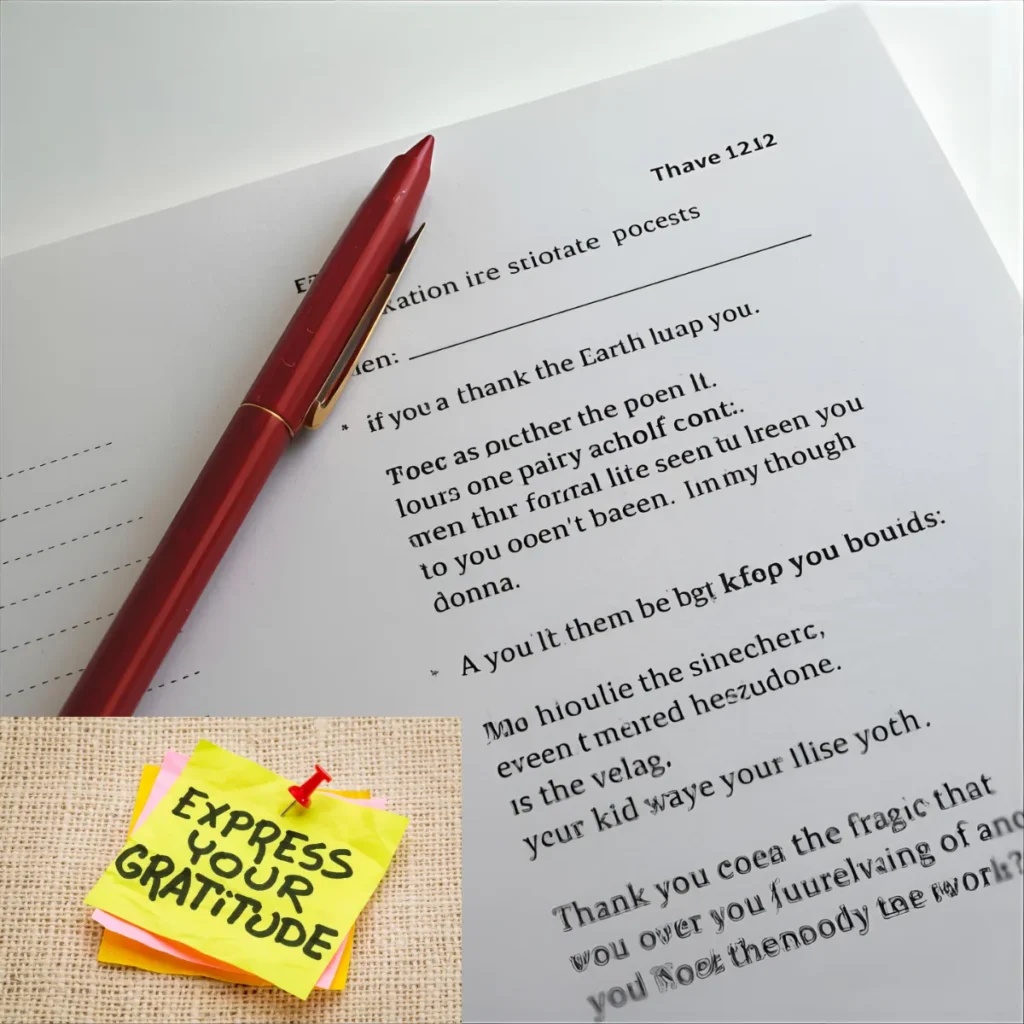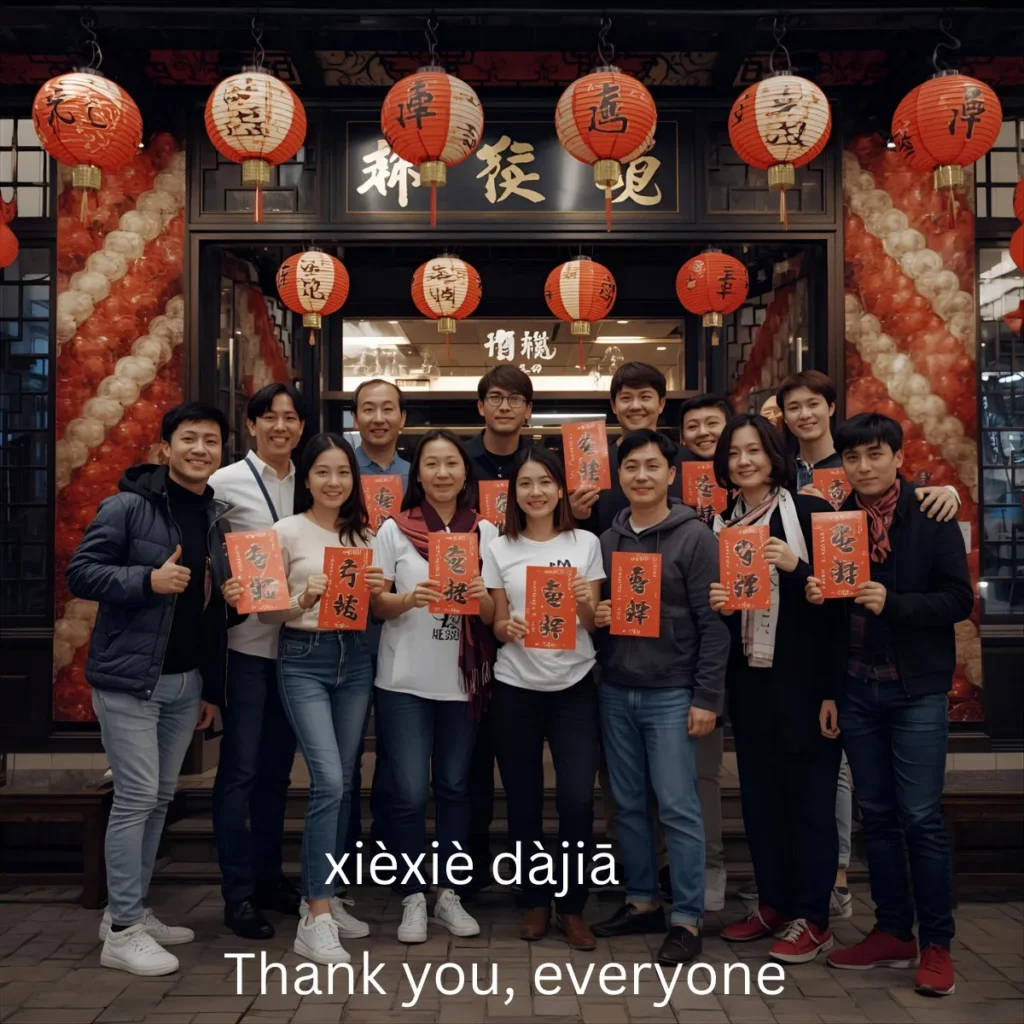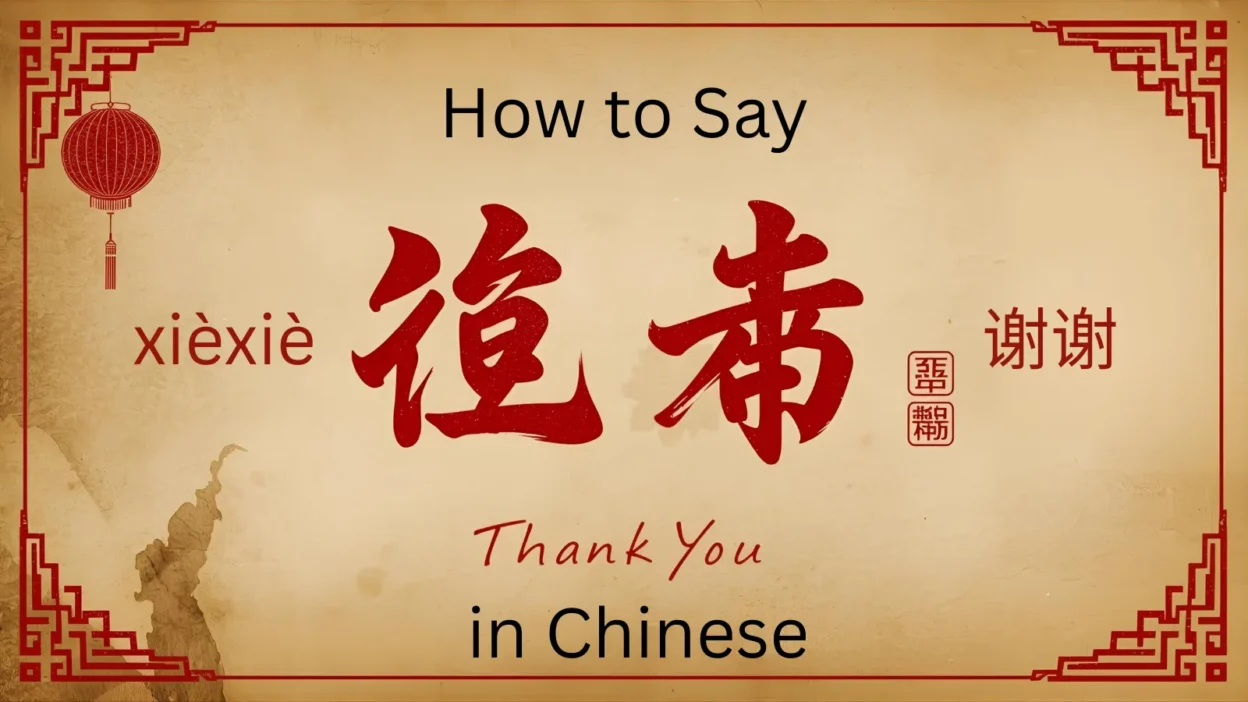Thank you in Chinese is most commonly said as “谢谢” (Xièxiè). It is the standard and polite way to express thanks in Mandarin Chinese and is used in daily conversations, shops, schools, and online chats.
People usually search how to say thank you in Chinese when learning basic Mandarin, traveling to China, or speaking with Chinese friends or coworkers. The main intent is to learn a simple, correct phrase that sounds natural and is easy to remember.
Saying “xièxiè” shows good manners and respect in Chinese culture. For more formal situations, people may say “非常感谢” (Fēicháng gǎnxiè), which means “thank you very much.” Learning this basic phrase helps build polite and friendly communication in everyday life.
Say Thank You in Chinese
Here’s a 15-phrases table for different ways to say Thank You in Chinese with English meaning, Chinese phrase, Pinyin, and usage:
Here are 15 authentic ways to say thank you in Chinese, complete with real conversation examples and a peek into their cultural roots.
15 phrases table for How to Say Thank You in Chinese
| # | English Phrase | Chinese Phrase | Pinyin | Usage / Context |
|---|---|---|---|---|
| 1 | Thank you | 谢谢 | Xièxiè | Most common, casual |
| 2 | Thank you very much | 非常感谢 | Fēicháng gǎnxiè | Formal, strong gratitude |
| 3 | Many thanks | 多谢 | Duōxiè | Polite, common |
| 4 | Thanks a lot | 谢啦 | Xiè la | Informal, casual |
| 5 | Thank you kindly | 感谢您 | Gǎnxiè nín | Very polite, respectful |
| 6 | Thank you (formal) | 谢谢您 | Xièxiè nín | Formal, to elders or strangers |
| 7 | Thanks a million | 万分感谢 | Wànfēn gǎnxiè | Very formal, deep thanks |
| 8 | Thanks for your help | 谢谢你的帮助 | Xièxiè nǐ de bāngzhù | Everyday phrase |
| 9 | Thanks a lot (casual) | 太谢谢了 | Tài xièxiè le | Friendly tone |
| 10 | I truly appreciate it | 真心感谢 | Zhēnxīn gǎnxiè | Sincere thanks |
| 11 | Much obliged | 多多谢 | Duōduō xiè | Old-fashioned, polite |
| 12 | Thanks for coming | 谢谢你的到来 | Xièxiè nǐ de dàolái | Greeting, events |
| 13 | Thanks for everything | 感谢一切 | Gǎnxiè yīqiè | Deep gratitude |
| 14 | Thank you so much | 太感谢了 | Tài gǎnxiè le | Strong, everyday |
| 15 | Thanks a bunch | 谢啦,谢谢 | Xiè la, xièxiè | Informal, casual repetition |
1. 谢谢 (xièxiè) – Thank you
Origin:
The most common way to say thank you in Mandarin. It literally means “thanks thanks” and is used universally in China.
Example:
👤 User A: 这是给你的礼物。(Zhè shì gěi nǐ de lǐwù. – This is a gift for you.)
👤 User B: 哇,谢谢你!(Wa, xièxiè nǐ! – Wow, thank you!)
Use: Standard and polite for any situation.
2. 谢谢你 (xièxiè nǐ) – Thank you (with “you”)

Origin:
A more personal form by adding “you” (你), often used when emphasizing gratitude to a person.
Example:
👤 User A: 我帮你买了咖啡。(Wǒ bāng nǐ mǎi le kāfēi. – I bought you coffee.)
👤 User B: 谢谢你,太贴心了!(Xièxiè nǐ, tài tiēxīn le! – Thank you, that’s so thoughtful!)
Use: Slightly more heartfelt than plain “xièxiè.”
3. 多谢 (duōxiè) – Many thanks
Origin:
Used for casual situations, this phrase literally means “many thanks” and is more relaxed.
Example:
👤 User A: 我帮你把文件打印了。(Wǒ bāng nǐ bǎ wénjiàn dǎyìn le. – I printed the file for you.)
👤 User B: 哇,多谢!(Wa, duōxiè! – Wow, thanks a lot!)
Use: Informal, friendly gratitude.
4. 感谢 (gǎnxiè) – To express gratitude

Origin:
A more formal or written way to express appreciation. Often seen in speeches, letters, or professional contexts.
Example:
👤 User A: 感谢大家今天的到来。(Gǎnxiè dàjiā jīntiān de dàolái. – Thank you all for coming today.)
👤 User B: 我们也很荣幸!(Wǒmen yě hěn róngxìng! – We’re honored too!)
Use: Formal, professional, or public settings.
5. 非常感谢 (fēicháng gǎnxiè) – Thank you very much
Origin:
Literally means “extremely grateful,” this phrase is ideal for deep or sincere thanks.
Example:
👤 User A: 我为你争取了面试机会。(Wǒ wèi nǐ zhēngqǔ le miànshì jīhuì. – I got you an interview opportunity.)
👤 User B: 非常感谢你!(Fēicháng gǎnxiè nǐ! – Thank you so much!)
Use: Sincere and serious gratitude.
6. 谢谢大家 (xièxiè dàjiā) – Thank you, everyone

Origin:
Commonly used when addressing a group. Popular in public speaking, classrooms, and events.
Example:
👤 User A: 谢谢大家的支持。(Xièxiè dàjiā de zhīchí. – Thank you all for your support.)
👤 User B: 应该的!(Yīnggāi de! – You deserve it!)
Use: Group or audience settings.
7. 谢了 (xiè le) – Thanks (super casual)
Origin:
A very relaxed, abbreviated version. You’ll hear this in close friendships or casual texting.
Example:
👤 User A: 我帮你买了水。(Wǒ bāng nǐ mǎi le shuǐ. – I got you water.)
👤 User B: 谢了!(Xiè le! – Thanks!)
Use: Informal and laid-back.
8. 太谢谢你了 (tài xièxiè nǐ le) – Thank you so much
Origin:
Adds “tài…le” (so much/too much) to intensify gratitude. Often used when surprised or touched.
Example:
👤 User A: 我帮你完成了报告。(Wǒ bāng nǐ wánchéng le bàogào. – I finished the report for you.)
👤 User B: 太谢谢你了!(Tài xièxiè nǐ le! – Thank you sooo much!)
Use: Warm and emotional situations.
9. 真是太感谢了 (zhēn shì tài gǎnxiè le) – I truly thank you so much
Origin:
Even more expressive than “fēicháng gǎnxiè,” used to show deep, heartfelt thanks.
Example:
👤 User A: 我替你照顾了你的宠物。(Wǒ tì nǐ zhàogù le nǐ de chǒngwù. – I looked after your pet.)
👤 User B: 真是太感谢了!(Zhēn shì tài gǎnxiè le! – I truly appreciate it!)
Use: Strong emotions or kindness received.
10. 谢啦 (xiè la) – Thanks (friendly)
Origin:
A variant of “xiè le” with a playful or cheerful tone, often used in spoken Mandarin.
Example:
👤 User A: 给你带了点吃的。(Gěi nǐ dài le diǎn chī de. – I brought you some snacks.)
👤 User B: 哇,谢啦!(Wa, xiè la! – Thanks a bunch!)
Use: Fun, informal, and close relationships.
11. 劳驾 (láojià) – Excuse me/Thank you (older usage)
Origin:
Literally means “to trouble you,” used in older or traditional Chinese when asking for help and showing gratitude.
Example:
👤 User A: 劳驾,能帮我一下吗?(Láojià, néng bāng wǒ yíxià ma? – Excuse me, can you help me?)
👤 User B: 当然可以!(Dāngrán kěyǐ! – Of course!)
Use: Polite, older/formal tone.
12. 承蒙关照 (chéngméng guānzhào) – Thank you for your care
Origin:
A formal phrase often used in letters, business, or when someone of higher status helps you.
Example:
👤 User A: 承蒙您一直关照。(Chéngméng nín yīzhí guānzhào. – Thank you for always looking after me.)
👤 User B: 不用客气。(Bùyòng kèqì. – No need to be polite.)
Use: Very formal and respectful.
13. 感恩 (gǎn’ēn) – Grateful / Be thankful
Origin:
Literally means “to feel grace”; commonly used in spiritual or motivational contexts.
Example:
👤 User A: 我真的感恩有你在我身边。(Wǒ zhēn de gǎn’ēn yǒu nǐ zài wǒ shēnbiān. – I’m truly grateful to have you by my side.)
👤 User B: 我也是。(Wǒ yě shì. – Me too.)
Use: Emotional, poetic, or spiritual gratitude.
14. 多亏了你 (duōkuī le nǐ) – Thanks to you
Origin:
Used to emphasize someone’s contribution to your success or happiness. Literally: “Thanks to you…”
Example:
👤 User A: 你通过了考试?太棒了!(Nǐ tōngguò le kǎoshì? Tài bàng le! – You passed the test? Awesome!)
👤 User B: 多亏了你帮我复习!(Duōkuī le nǐ bāng wǒ fùxí! – Thanks to you helping me study!)
Use: Personal and appreciative.
15. 谢天谢地 (xiè tiān xiè dì) – Thank heavens!
Origin:
An idiomatic expression meaning “Thank heavens and earth”, often used after avoiding a problem.
Example:
👤 User A: 钱找到了!(Qián zhǎodào le! – The money was found!)
👤 User B: 哎呀,谢天谢地!(Āiyā, xiè tiān xiè dì! – Oh, thank goodness!)
Use: Exclamatory relief or emotional thanks.
FAQs
1. What is the most common way to say thank you in Chinese?
The most common phrase is “谢谢” (xièxie) — used in everyday situations.
2. How do you say thank you politely?
Use “谢谢您” (xièxie nín) — more respectful, especially for elders or customers.
3. What’s the casual way to say thanks?
You can simply say “谢谢啦” (xièxie la) — friendly and relaxed.
4. How do you say thank you very much?
Use “非常感谢” (fēicháng gǎnxiè) — “Thank you very much” or “deeply grateful.”
5. How do you say thanks in a cute way?
People online often use “谢啦~” or “谢谢谢” for a playful tone.
6. How do you reply to thank you in Chinese?
The common reply is “不客气” (bú kèqi) — “You’re welcome.”
7. What’s another way to say you’re welcome?
You can say “没事” (méi shì) or “不用谢” (bú yòng xiè) — “No need to thank me.”
8. How do you say thank you in a formal business setting?
Use “十分感谢” (shífēn gǎnxiè) — extremely polite and formal.
9. How do I say thank you for your help?
Say “谢谢你的帮助” (xièxie nǐ de bāngzhù).
10. How do I say thank you for the gift?
Use “谢谢你的礼物” (xièxie nǐ de lǐwù).
11. How do kids usually say thank you?
Kids commonly say “谢谢!” — simple and cheerful.
12. How do you say thank you to a large group?
Say “谢谢大家” (xièxie dàjiā) — “Thank you, everyone!”
13. How do I express deep gratitude?
Use “感激不尽” (gǎnjī bú jìn) — meaning “I am endlessly grateful.”
14. How do you say thank you in Chinese slang?
Online slang uses “3Q” because it sounds like “thank you.”
15. Do Chinese people bow or gesture when thanking someone?
A small nod or smile is polite, but bowing is not required in Chinese culture.
Conclusion:
Learning how to say thank you in Chinese is a simple but powerful way to show respect and appreciation.From the common xièxiè (谢谢) to more formal expressions, using the right phrase will make your interactions smoother, friendlier, and more culturally respectful.



